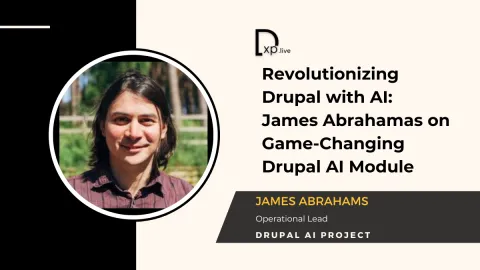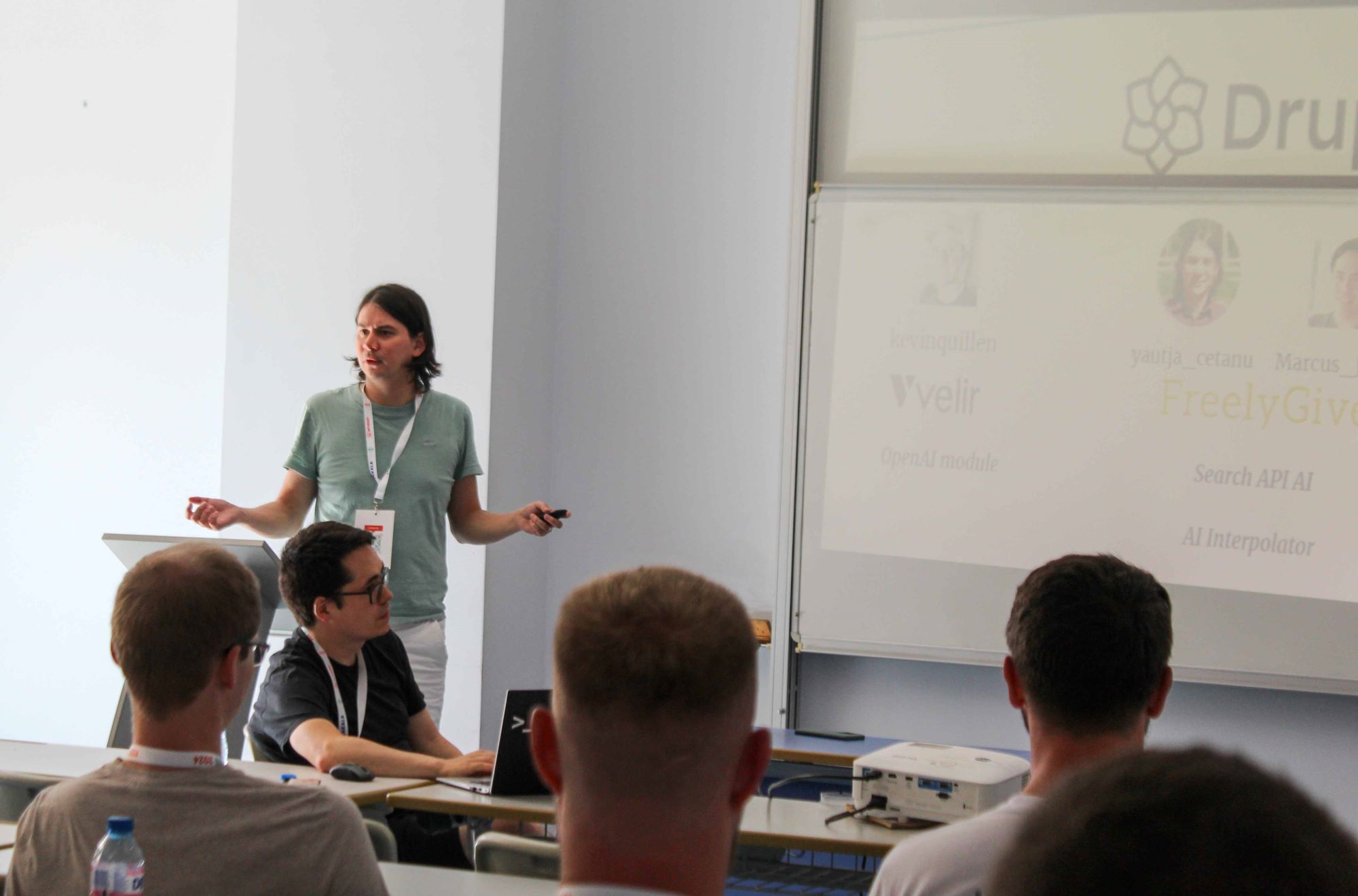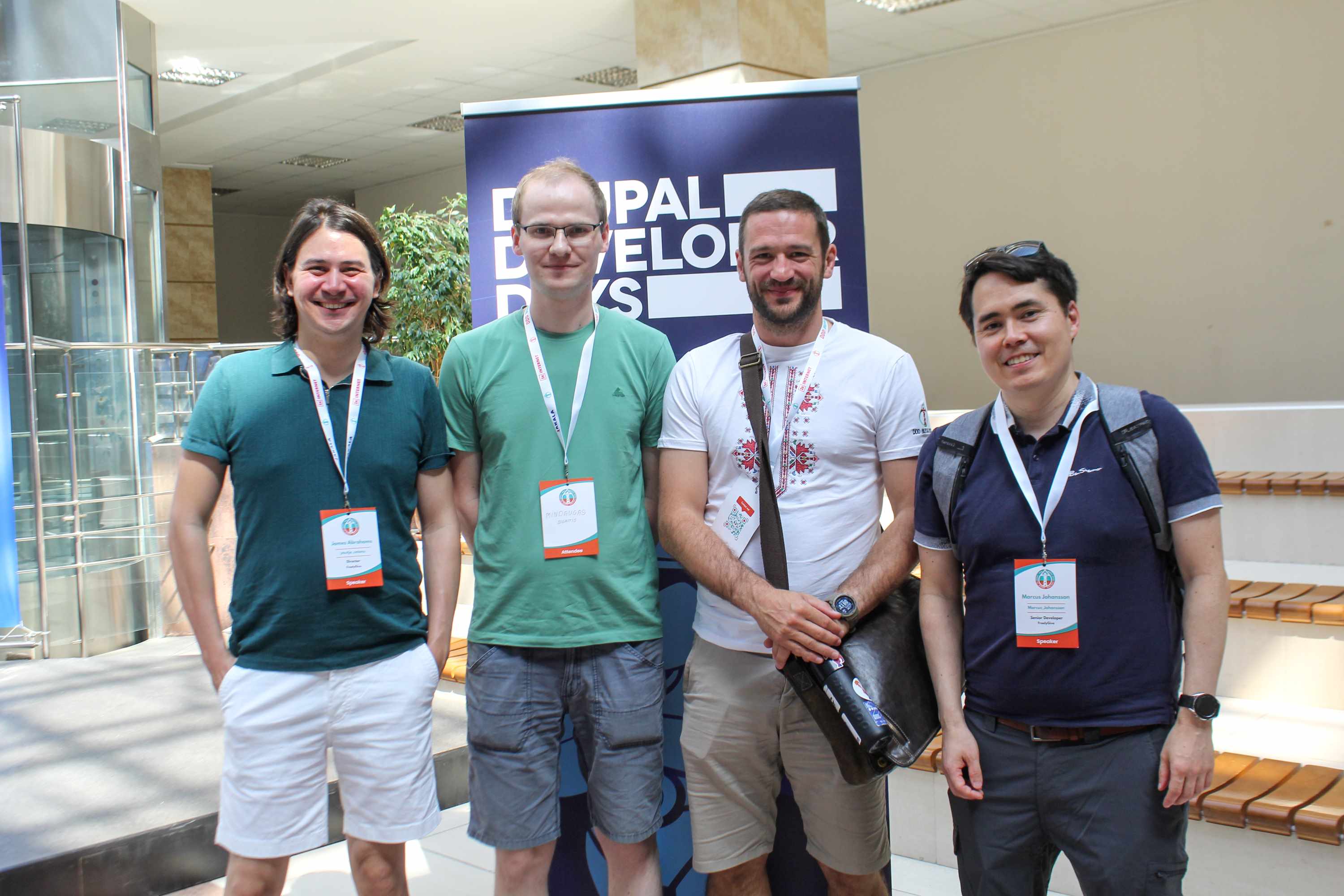Revolutionizing Drupal with AI: Insights from James Abrahams on the Game-Changing Drupal AI Module
How AI Automation is Set to Transform Open-Source CMS Development and Content Management

James Abrahams is a pioneering figure in the Drupal community, known for his innovative work at the intersection of artificial intelligence and content management systems. As the co-founder of Freely Give, a company specializing in Native Drupal CRM solutions, James has been at the forefront of developing business applications using Drupal for over a decade.
His journey in the tech world began with creating solutions for churches and charities, eventually leading to the development of sophisticated systems like the delay-repay system for train operating companies. This experience laid the groundwork for James's current focus on AI integration in Drupal.
Recognizing the transformative potential of AI in web development, James became deeply involved in exploring and implementing AI solutions within the Drupal ecosystem. His work has culminated in the development of the Drupal AI module, a project that aims to revolutionize how AI is used in content management and web application development.
As the operational lead on the Drupal AI project, James brings his extensive experience and visionary approach to the table. He has been instrumental in creating an abstraction layer that allows for the integration of various AI models, making the technology more accessible and adaptable for Drupal users.
James is also known for his contributions to the Drupal community through talks and presentations, including his appearance at Drupal Dev Days in Vienna. His passion for AI and its applications in Drupal has led him to not only develop new technologies but also to foster a community of like-minded innovators in the field.
With his unique blend of technical expertise and entrepreneurial spirit, James continues to push the boundaries of what's possible with Drupal and AI, paving the way for more intelligent, efficient, and user-friendly web solutions.
In the rapidly evolving landscape of content management systems, artificial intelligence is emerging as a transformative force. At the forefront of this revolution is the Drupal AI module, a groundbreaking project that promises to reshape how we build, manage, and interact with websites.
Akanksha Mishra, Editor of Digital Experience.Live, recently sat down with James Abrahams, co-founder of Freely Give and operational lead on the Drupal AI project. With over a decade of experience in Drupal development and a passion for AI innovation, James offers unique insights into the future of AI-powered web development.
In this exclusive interview, James shares the journey that led to the creation of the Drupal AI module, its potential impact on the open-source CMS landscape, and the exciting innovations it brings to content creation and site management. From AI-driven automation to intelligent content generation, discover how this module is set to empower developers and content creators alike.
Join us as we explore the cutting-edge intersection of AI and Drupal, and learn how these advancements are poised to make web development more accessible, efficient, and powerful than ever before.
Can you tell us about your background and what led to the creation of the Drupal AI project?
James Abrahams: I founded a company called Freely Give with a friend from school. We started in the church and charity space, focusing on native Drupal CRM. For a long time, we built Drupal sites that were more business applications than front-end websites.
One of our projects was a delay-repay system for train operating companies. When AI came along, we saw a great opportunity to automate parts of this process. We started with ChatGPT and achieved close to 90% automation rates with high accuracy.
This success really opened our eyes to the potential of AI in Drupal. For the last year and a half, I've been obsessed with AI, giving talks and trying to build things in the community.
Recently, Marcus Johansson, who created the AI Interpolator module, joined us. This really jump started our AI work as he could build demos so quickly. Around this time others in the Drupal AI community were finding things were taking off too. Kevin Quillen from the OpenAI module reached out to us with an idea to make a unified AI module. Seogow had created an LLM provider and Scott Euser had helped Kevin a lot with AI search. This led to the creation of the AI module and an abstraction layer that allows us to use any AI model.

What inspired the Drupal AI project, and what's your vision for it in the coming years?
James Abrahams: The inspiration was everything I said before, but we were waiting on the AI module because what we wanted to do was prove that AI could actually be useful. Did it just make fun demos or could actually make a difference to people's lives?
At the time, it was all OpenAI. So everyone built on top of OpenAI. That was great. What we're finding is two things have happened. One, competition from Claude has become a big deal. Claude is really good now. So there's now competition to OpenAI. If you're in Europe, Mistral is much better with the French language than a lot of the other models. But also open source has gotten really good. It wasn't good a year ago. It's now actually genuinely usable.
So that's one of the motivations for making this abstraction layer, which means that when you build on top of this, you can swap out to any single model. It means all the functionality that we build for AI, when a new model comes out that's a better one in a year's time, we'll be able to swap out to that. It means that when you build things that aren't good enough, open source isn't good enough for it yet, you can still keep testing it. And as soon as open source gets good enough, you can swap it out and then move forward with that.
In terms of vision, over the next month, we're releasing the AI search module, the AI automators module, and a whole bunch of smaller ones like AI translate, CK editor, et cetera. So what we're hoping to see in the next month or so is the AI module go from just being an abstraction layer to being a whole bunch of tools you can use to do really cool stuff out of the box with.
I'm very intrigued about using AI to help the experience of creating Drupal sites. We've got some demos of uploading PDFs and creating content for you, drawing a web form and creating a whole web form for you. And so I'm very intrigued about the idea of something like, we're calling it like Figma to Drupal or WordPress migration, something where you can put in a design, click a button and AI will build the whole site for you. It'll create the theme, the layouts, the content, everything.
How do you see the Drupal AI module impacting the broader open-source CMS landscape?
James Abrahams: I think AI Automator is way, way cooler than a lot of people realize right now. So a lot of people in the Drupal community, they're focusing on using AI to help the editing experience or building a Drupal site. But there's loads of jobs and loads of projects that we do that AI can automate when you chain different steps together.
I believe the AI Automators feature will be a game-changer. It enables non-developers to build AI applications in 20-30 minutes. This could be transformative for many jobs, especially in office environments.
For example, we've built tools that can process podcasts, create LinkedIn posts, and even help analyze venues for corporate event organizers. - all with minimal coding knowledge. This democratization of AI application development could position Drupal as a leading platform for creating AI-powered solutions.
There's a lot of tools out there that do stuff that help you chain prompts together and build AI applications. But they either tend to be very code-focused, or, if they do have a UI, they tend to be very limited in scope to just the AI. They can't do any of the other stuff that Drupal can do. Or finally, they're proprietary solutions. And there's nothing quite like it.
So my prediction is that Drupal has the ability to become the main place where everyone builds AI-based applications that are more advanced than what you can get by just going to chat.openai.com. I think that can be quite powerful.
Can you share some of the best innovations that this module will offer?
James Abrahams: I think I'll go back to the AI automators. The AI Automators is the most innovative aspect. The enabling non-developers to build AI applications in like 20 minutes, 30 minutes- it's really cool. For instance, we created a tool that can download YouTube videos, transcribe them, summarize content, and generate social media posts - all in about 30 minutes. I think it's ginormous.
So almost anyone who does any single thing, particularly any office job, I think when you get your hands on automators, if you spend like 20 minutes learning how it works, you'll immediately find there's so many things that you do in your day-to-day life that I think you'd be able to do with automators, especially at enterprise level, enterprise research projects.
For instance, we built an event organizing tool that if you're a corporate event organizer, you've got a bunch of venues that you want to research. You can put in the URLs for all the venues that you're looking at and it would go to the website, scrape it, store that data in Drupal, summarize it, pull out all the important information like max capacity, min capacity, give you tags of the kind of events in there, look at local transportation, hotels, pull in Google reviews and summarize them, put them all in a view so you can see them ordered and sort them. You could even make it so it produced a PowerPoint presentation for you or even a little video that you can see, show the rest of your team.
This event-organizing tool can research venues, scrape websites, summarize information, and even create presentations. These applications demonstrate the power and accessibility of the AI module.
How do you envision the Drupal AI module transforming content creation and management in Drupal-based websites?
James Abrahams: In the short term, we'll see features like one-click translation, content summarization, and tools to help write content for specific target demographics. AI will assist in the content review process, helping with basic editing tasks and highlighting areas for human editors to focus on.
However, it's important to note that as AI becomes more widely used, the challenge will be in differentiating your content. When everyone has access to the same AI tools, the value will come from how you uniquely apply them and combine them with human insights.
We're developing an evaluations module to help users assess how well their AI-generated content performs against specific goals, whether that's customer satisfaction, search rankings, or social media engagement.

Do you think the Drupal AI module can suggest topics for content creation, reducing the need for manual research?
James Abrahams: In the coming months, with the AI module, you'll be able to do things like click a button to translate it, click a button to summarize your content, look at your content and go, oh, this is too verbose. I want to change things around.
I think it's going to be a lot easier to write content that sounds like your target demographic. So if you're writing in a language that is not your native language, or if you are trying to write to a specific group of people, it's going to be a lot easier to write summaries and then generate the whole thing. I think it's going to be really helpful to have AI help with the content review process, double checking things, doing basic things for editors, highlighting things for editors.
But the thing is, already, if you use Claude or OpenAI, that's transformed a lot of content generation. So in Drupal, we're going to make it slightly easier for you.
The problem with a lot of this and why it's hard to predict is that everyone has access to the same AI as everyone else. So whilst it can predict topics to you, it will predict the same topics to everyone else. So similarly with search results, everyone now can start using AI to give you recommended topics that will give you good search results. But the more people that do the same things, the less powerful that will be.
What you have to do is try and find a way of differentiating yourself from everyone else who has access to the same UI, same AI. And that's where it's going to be hard to figure out exactly how that's going to impact you as a content creator because you're going to still have to find some way in which you provide some value.
We're going to release a module at some point called the evaluations module. And the evaluations module is about seeing how good your AI is at achieving goals and use statistics to do that. That goal might be you have a customer service bot and people were happy. The goal might be you automated something correctly. The goal might mean you wrote some content and it did well with search rankings or on LinkedIn or whatever.
Is there anything else you'd like to share about the Drupal AI module?
James Abrahams: We're planning a significant release in the next couple of days that will include the AI Automators in alpha. The AI search functionality is also close to a releasable state. In the next two to three weeks, the AI module is going to become even more powerful and feature-rich. It will include other helpful features such as AI Translate, CKedit widgets and content widgets similar to the OpenAI module.




